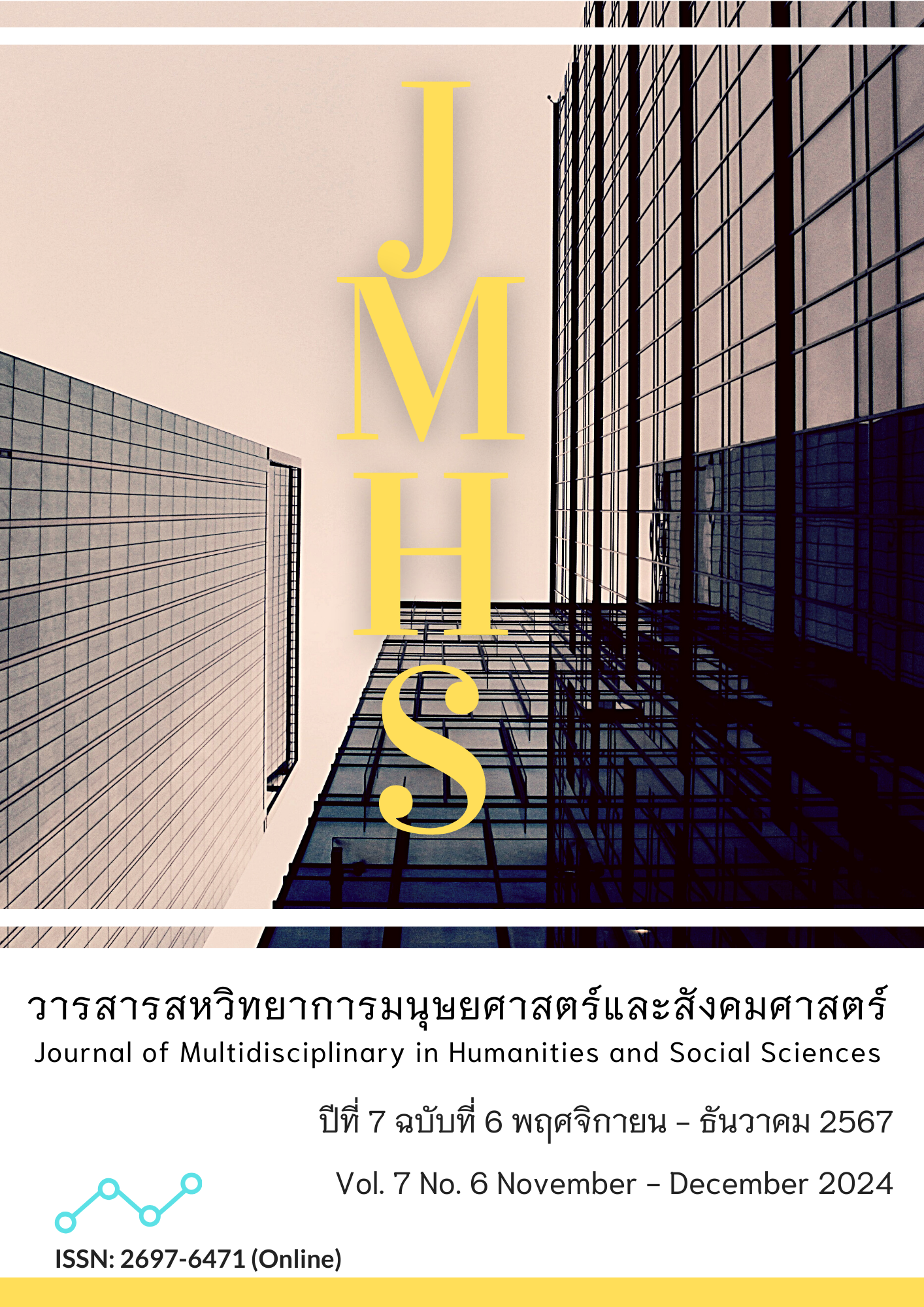Development of a Training Curriculum to Enhance Classroom Assessment Competency of Student Teachers
Main Article Content
บทคัดย่อ
This study aimed to 1) develop a training curriculum to enhance classroom assessment competency of student teachers and 2) study the effectiveness of the training curriculum. The sample group consisted of 24 student teachers majoring in primary education at Hubei University of Science and Technology. This study selected them through simple random sampling. The instruments used for collecting data were the research-related literature, the curriculum based on competency development, the lesson plans and instruction materials, the classroom assessment competency questionnaire, the student self-assessment form, and the student satisfaction questionnaire for the curriculum. Analyze data by descriptive statistics and content analysis. The research results were found as follows:
The components of the training curriculum include the principles of the curriculum, the objectives of the curriculum, the contents of the curriculum, teaching strategies, learning media and resources, and the assessment and evaluation. The results of the evaluation of the draft curriculum by experts showed that the mean scores of the curriculum appropriateness evaluation were from 4.4 to 5.00, which were higher than 3.51, which means that the curriculum was appropriate from the high level to the very high level. The Index of Item Objective Consistency (IOC) revealed scores ranging from 0.8 to 1.00, surpassing the criterion of 0.5. This indicates that all the curriculum components exhibit consistency with each other.
The classroom assessment competency of student teachers after implementing the training curriculum was higher than before at the statistical significance level of .05. Student teachers' satisfaction with the curriculum was reflected in their mean scores, indicating high performance levels.
Article Details

อนุญาตภายใต้เงื่อนไข Creative Commons Attribution-NonCommercial-NoDerivatives 4.0 International License.
ทัศนะและความคิดเห็นที่ปรากฏในวารสาร ถือเป็นความรับผิดชอบของผู้เขียนบทความนั้น และไม่ถือเป็นทัศนะและความรับผิดชอบของกองบรรณาธิการ
เอกสารอ้างอิง
Airasian, P. W. (1997). Classroom assessment (3rd ed.). New York: McGraw-Hill.
Connelly, F. M, Clandinin, D. J., & He, M. F. (1997). Teachers’ personal practical knowledge on the professional landscape. Teaching and Teacher Education, 13, 665-674. DOI:10.1016/S0742-051X(97)00014-0
Gredler, M.E. (2008). Learning and Instruction: Theory into practice (6th ed.). Pearson.
Hutinger, P. L. (1983). Competency-based teacher education. The Technical Assistance Development System.
Lewy, A. (1991). National and school-based curriculum development. Paris: UNESCO.
Liu, H (2010). Research on the processing of classroom evaluation results to promote learning(Doctoral dissertation), East China Normal University.
Looney, A., Cumming, J., van Der Kleij, J., & Harris, K. (2017). Reconceptualising the role of teachers as assessors: Teacher assessment identity. Assessment in Education Principles Policy and Practice, 25(4), 1-26. DOI:10.1080/0969594X.2016.1268090
McMillan, J.H. (2015). Classroom assessment. International Encyclopedia of the Social & Behavioral Sciences (Second Edition), 819-824. https://doi.org/10.1016/B978-0-08-097086-8.92074-9
Mertler, C.A. (2003). Preservice Versus Inservice teachers’ assessment literacy: Does classroom experience make a difference?. In Paper presented at the annual meeting of the Mid-Western Educational Research Association (Columbus, OH, Oct. 15–18, 2003). https://eric.ed.gov/?id=ED482277
Ornstein, A. C., & Hunkins, F. P. (1998). Curriculum: Foundations, principles, and issues (3rd ed.). Needham Heights, MA: Allyn & Bacon.
Qin, W. (2017). Research on improving novice teachers’ classroom teaching evaluation literacy. Zhengzhou: Henan Normal University.
Rural, J.D. (2021). Competency in assessment of selected DepEd teachers in national capital region. European Online Journal of Natural and Social Sciences, 10(4), 639-646. https://european-science.com/eojnss/article/view/6279
Schmieder, A.A. (1973). Competency-based education: The state of the scene. American Association of Colleges for Teacher Education.
Stiggins, R. J. (1999). Evaluating classroom assessment training in teacher education programs. Educational Measurement: Issues and Practice, 18(1), 23-27.
Vogler, D. (1973). An introduction and overview of Competency-Based Teacher Education (CBTE). Retrieved from https://files.eric.ed.gov/fulltext/ED089122.pdf
Wang, S. (2008). Current situation and attribution analysis of teachers’ evaluation literacy in China. Contemporary Educational Science, (12), 3-8.
Wang, S. (2018). Classroom assessment to promote learning. Shanghai: East China Normal University Press.
Wei, L. (2021). Classroom evaluation in basic education: function "alienation" and value regression. Contemporary Educational Science, (10), 43-50.
Xu, Z. (2017). Research on the training of normal skills for students majoring in primary education——taking the primary education major of Harbin university as an example. Forest Teaching, (12), 102-103.
Zhang, J. (2016). Modern educational technology. Beijing: Higher Education Press.
Zheng, D. (2014). The relationship between classroom evaluation and teaching. Curriculum. Teaching Materials. Teaching Methods, (12), 33-38.
Zhong, Q. (2012). Classroom evaluation and the cultivation of teachers’ classroom evaluation literacy. Modern Basic Education Research, (1), 111-115.


